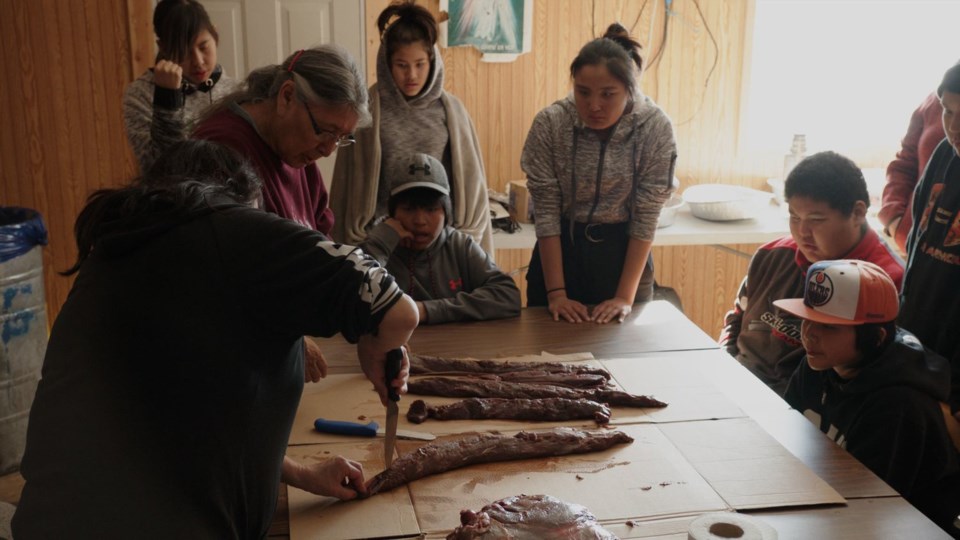The Golden Sheaf awards are up this weekend, and one person that’s up for three awards is Ian Toews. The director, writer and cinematographer talked to Yorkton This Week about the projects he has up for awards this year.
The film up for two awards is Etthén Heldeli: Caribou Eaters, which follows the Dene people in northern Saskatchewan. It’s up for two awards, the Ruth Shaw Award for Best of Saskatchewan and Best Multicultural over 30 minutes.
Part of the inspiration for the film was that they felt not enough was said about the Dene people and their connection to the caribou, and City TV, which aired the documentary, agreed. They wanted to present a complete picture of the caribou hunt and the people who live on it.
“One of the goals was to really be comprehensive about the seasons in nature that the Dene people are facing, most of which are winter, but there’s a short summer season, a short spring and a short fall as well.”
The documentary shows people traditions that not everyone gets to see, and Toews said that their job was to build trust with the people. The project saw the crew go along on the hunt, the highlight of the film according to Toews, a six day trip where they saw the crew shoot, prepare and transport the caribou.
Given that they go far up north, where many people are not able to travel, one unique component to the project was a 360 video shot by Cary Ciesielski. It allows the audience to see the area where the Dene people live.
Shooting in northern Saskatchewan, in the winter, the biggest challenge was the cold weather. Cameras don’t like -25 degrees Celsius. This is especially true of the little cameras used for the 360 component, which have to be synchronized.
“There are six cameras on this apparatus, and by the time you get to the sixth camera the first one is have frozen because it’s so cold. So there were a lot of challenges he had to put up with to get it shot, but he made it, he managed to get quite a few things filmed while we were there. I couldn’t help him because I was busy wrestling with my own camera in four feet of snow, so every time I put down my camera the tripod would plunge down. So it was a lot of fun, good exercise for me and him!” Toews said.
The other big challenge was the distance. You can fly in with limited gear, or drive up through rough roads, which Toews describes as ‘quite an experience.’
“Then you get up there and conditions change or something else happens in the community, you’re not going anywhere. You’re in a whole different place up there.”
The film covers traditions, and the elders and the importance of what they’re trying to teach the next generation. Toews believes it’s important that their wisdom is passed on, and if they help by filming it, that’s worthwhile.
“We’re not First Nations ourselves, but in our own little way we’re passing on that information, because we’re recording it.”
The other main subject the film the caribou themselves, which have a declining herd and how sensitive the sub-arctic area is. The caribou numbers are falling quickly, but the reasons aren’t clear, though forest fires running through the forest up north are changing the migration patterns.
“They just have less routes that are accessible to them, added to which, the numbers are falling all over sub-arctic Canada.”
And as the caribou suffer, so too do the people who hunt them and rely on them.
“The poetry of it all is that the Dene and the caribou are inextricably linked, they’ve been together for over 10,000 years.”
The second project that received a nomination is Ageless Gardens, a television series about health and wellness as we age, through gardening, filming across Canada, including episodes in Saskatchewan. It is aired on VisionTV. It is up for Best Documentary Series.
“What we like about making the series is that the older people we feature tend to have an incredible amount of wisdom about their gardens. Quite a few of them are in their 70s and their 80s, we’ve got gardeners in the first season in their 90s. That level of knowledge goes back decades.”
While about different people, there are themes shared between the two programs. Both are cataloging the wisdom of the elder generation and the importance of nature in our lives.
“The world is full of people who are not listening to things or learning, and maybe should be learning more from people.”




